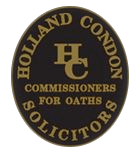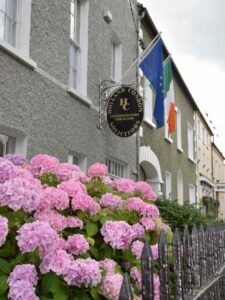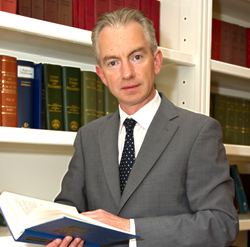Yesterday, after an accident claim case in Kilkenny city, I left the Courthouse on Parliament street. I bumped into an hotel manager, whom I hadn’t seen in years. I recalled that I had given him, and other catering students, a series of lectures on Irish Law, back in the 1990’s. Bobby Kerr, an icon of the Irish Hotel Industry,(and father to present Dragon’s Den member with the same name), had asked me to prepare a talk om legal issues that would interest trainee hotel managers.
So Brian, as promised, here’s the one i gave to your group !
LAW AND HOTEL TRADE
LAW
Can be defined as the unwritten and written rules and regulations binding the Citizens of a State. There are four mains sources of Law in Ireland – the Constitution, the Law of the European Community, Acts/Statutes of the Oireachtas and Ministerial Orders; Common Law i.e, Judge made Law.
We can say that there are basically two types of Law in this Country; Civil Law and Criminal Law. Criminal Law, as the name indicates deals with crime and Civil Law deals with everything else.
The main role of the Courts is to interpret and apply the Law, both Civil Law and Criminal Law. The Courts are divided up into a Hierarchy ranging from the District Court to the Supreme Court
District Court – Minor Criminal Offences and Civil
Claims up to œ5,000.00.
Circuit Court – More serious crime and Civil Claims
up to œ30,000.00.
High Court – Very serious crime and Civil Claims
exceeding œ30,000.00.
Supreme Court – Hears appeals from High Court, interprets
the Constitution and rules on the Constitutionality of
the Laws made by the Oireachtas.
Why not take a trip down to your local District Court (Kilkenny on Tuesdays at 11.00 a.m.).
Story
Mr and Mrs Brightspark, and their son Johnny Rotten arrived in the front garden of Some Service hotel. They booked in at reception and were informed by the Manager that the Hotel could not accommodate the Helicopter. Mr Brightspark asked that he could leave it in the garden any way and that it was his responsibility.
They booked into their rooms and that evening went for dinner. Their meal was beautiful only one complaint was received from Mrs Brightspark. She said that the photograph of the ice cream
on the menu looked more delicious than the one she had received. Also when the waitress was serving the coffee, the waitress leant across the table and poured the coffee into Mrs Brightsparks cup. Unfortunately, some of the coffee spilled onto Mrs Brightsparks lap and burnt her. Mrs Brightspark was offered first aid and a Doctor however she said that she was alright.
After the dinner, Mr Brightspark went to the leisure centre for a swim and Mrs Brightspark and young Johnny Rotten, who was 15 years of age went to the bar.
As Mr Brightspark entered the reception to the leisure centre he slipped on a pool of water and cut his head off the counter of the reception. He was given a few band aids and he went off for his swim. At the bar Mrs Brightspark and her son Johnny were having a great time. Young Johnny Rotten went up to the bar and asked for a pint of Guinness for his mother and a Brandy and dash of red for himself. The barman gave him the drinks. As the night went on the barman thought that Mrs Brightspark had not paid for a drink and he went across to her and told her that she had not paid for the drink. A row of words ensued and a number of people gathered around to look at the spectacle. Mrs Brightspark said that she was a very rich woman and she would always pay for her drink. Mrs Brightspark and Johnny Rotten left the bar and went to their bedrooms in disgust.
Mr Brightspark arrived back from the leisure centre and went into the bar for a few pints. The crack was good and he met a few of his old friends who lived down the road. They sang the night through until 2.00 a.m. when the Gardai called. Mr Brightspark asked the Gardai whether they would like to join in in a sing-song and the barman offered the Gardai some pints of Guinness to quench their thirst.
Meanwhile, the waitress who had spilt the coffee over Mrs Brightspark, was asked into the Managers Office and he fired her.
As Mr Brightspark went back to his room, he tripped over the wire of a hoover in the reception and accused the cleaning lady of being stupid. The cleaning lady said that she did not have to take this abuse and hit Mr Brightspark with a wooden chair. The Gardai called and took the cleaning lady to the Garda Station.
The following morning the Brightspark family were greeted with a beautiful sunny day. After having a scrumptious breakfast, they went for a walk in the gardens only to find that Mr Brightspark’s helicopter had been interfered with. Mr Brightspark ran back to the Hotel and informed the Manager and stated that the Hotel were responsible. Mr Brightspark said that the Hotel was responsible and he wanted the money now. The Manager informed him that they had agreed that the helicopter was Mr Brightsparks responsibility. Mr Brightspark said “Is this in writing?”. The Brightsparks stayed on for another few days. The residents of the Hotel and the Brightsparks complained of the constant noise of the neighbouring garage. The garage owner next door used to work right through the night until 4.00 a.m. and would have his power tools and engines revving right up until 4.00 a.m. in the morning. People couldn’t get asleep.
The Brightsparks enjoyed the rest of their stay in the Some Service Hotel and checked out. When checking out they stated that they had run short of money and that they would pay the balance of œ300.00 when they got back to Dublin. The Manager waited 7 days and still had not received any money despite sending a reminder to the Brightsparks. The Manager then got the Solicitors on the job to do something.
A summons was duly issued and Mr Brightspark rang the Manager saying that he was a Planning Official and had an important reputation in the Country. He said that he was going to get on to his Solicitors to sue the Hotel. Quite coincidently on the same day a Planning Official from the Local County Council called to visit the Manager and told the Manager that it would appear that his 48 bedroom extension last year was constructed without planning permission.
Hotel Proprietors Act, 1963
A Hotel is an establishment which provides sleeping
accommodation, food and drink in return for money
for all people who come to the Hotel.
A person who runs a Hotel has the following duties:-
(1) To receive all comers unless reasonable cause;
(2) To take reasonable care of all guests;
(3) Receive the property of all guests unless the Hotel
can’t cater/accommodate the property.
The Hotel Proprietor has a lien on the guests property in respect of money which is due to him for services rendered e.g., you are not getting back your baggage until you have paid for your room.
Licensing
There are certain things which we cannot do (i.e, illegal) unless we have a license, for example, driving a car. This also applies to cases where you are selling alcohol. You cannot sell alcohol unless you have a license entitling you to do this.
Licensing laws in Ireland are governed by the Licensing (Ireland) Act, 1902 – to Intoxicating Liquor Act, 1988. Most of the rules governing licensing are enshrined in Acts of the Oireachtas and not Judge made rules (known as common law).
There are various types of licenses including, the most common, a Publicans License (Ordinary) which entitles a Publican/Hotelier to sell liquor on/off the premises. All such licenses expire at the end of September in each year and must be renewed. In order to renew you must get your Tax Clearance Certificate from the Revenue Commissioners.
Because there were so many licensed premises in the Country up to the year 1900, the 1902 Licensing Act restricts the number of Licenses that can be issued.
There are many other types of licenses such as Manufacturers License, Wholesale License, Occasional License, Retail License for Racetrack/Clubs or Holiday Camps, Restaurant Certficate and Special Restaurant Licenses.
When you have a License you are under a duty and obligation to run your premises in accordance with the Law:-
You are not allowed to harbour thieves, prostitutes, Gardai, allow betting on the premises, bribe Gardai, obstruct the Gardai from entering the premises, adulterate alcohol (example add water to vodka), sell to drunken persons, sell to a Guard who is on duty, sell to people under the age of 18 years and most importantly you cannot sell alcohol except within prescribed times. (Listed below). You must use imperial measures for the sale of alcohol, you are entitled to refuse to serve drink to people, you must have your license on display and you must show the prices for the drink.
Hours during which alcohol can be sold:-
Summertime
Weekday – 10.30 a.m. – 11.30 p.m.
Sunday – 12.30 p.m. – 2.00 p.m.
– 4.00 p.m – 11.00 p.m.
Wintertime
Weekday – 11.00 a.m. – 11.00 p.m.
Sunday – 12.30 p.m. – 2.00 p.m.
– 4.00 p.m. – 11.00 p.m.
* St. Patricks Day must open after 12.30 p.m.
* Cannot sell drink on Good Friday or Christmas Day
* Drinking up time is 30 minutes.
By right therefore Public Houses should have their doors shut except during the above times however in the case of Hotels they can open at all times but must not sell intoxicating liquor except during the times as specified.
Hotels and places with Restaurant Certificates are entitled to longer opening hours, provided they are selling the intoxicating liquor with a meal. These extended hours are as follows:-
Weekdays – up till 12.30 a.m. in the morning.
Sunday – can open between 2.00 p.m to 3.00 p.m.
Christmas Day – can open between 1.00 p.m. to 3.00 p.m.
and 7.00 p.m. to 10.00 p.m.
No Hotel can serve intoxicating liquor on Good Friday to a non resident. Strange as it may seem there is no prohibition in the law for Hotels obtaining a special exemption order i.e., an extension for a disco into a Good Friday. I have not heard of any applications being made to Court for this.
Dance Licenses
An Hotelier must obtain a Public Dance License under the Public Dance Halls Act, 1935 for a place where dancing is open to the public. The Fire Safety Officer for the area and the Gardai take an interest in such licenses and how they are operated. You will need such a license where for instance you are holding discos.
Extensions/Exemption from permitted hours
It is possible to apply to the Court to allow you open for longer hours i.e., up until 1.00 in the morning – weddings, Gala Ball.
Music and Singing Licenses
Under the Public Health Acts (Amendment) Act, 1890 you must have a music and singing license for a premises whether it is public singing, music or public entertainment.
The Law of Torts
Negligence
This deals with where somebody has suffered a loss/injury as a result of a fault of another person – Donoghue -v- Stephenson: Snail in bottle. It is based on the presumption that we owe our neighbours a duty to take care. There are a number of factors involved namely causation, remoteness, duty of care, standard of care and proof of negligence.
It is the area which has been of great contention amongst Insurance Companies in the recent past because this Country has become so compo orientated.
It is one area of the law which you will undoubtedly come across in the Hotel trade e.g., people slipping and falling on floors, injuring themselves.
Trespass to the person
This is where you would touch a person without their consent e.g., the case of a man who kissed a lady on a bus, playing practical jokes/assault and battery. You would also be open to a criminal prosecution.
Defamation
Words which tend to damage a persons reputation/liable and slander e.g., accusing someone in the wrong of robbing in front of other people.
Nuisance/Rule in Rylands and Fletcher
Employment Law
There are many pieces of legislation which govern persons in employment, namely; Minimum Notice and Terms of Employments Act, 1973 to 1991; the Unfair Dismissals Act, 1977 and 1991, the Maternity Protection of Employees Acts, 1981 and 1991, Worker Protection (Regular and Part time Employees) Act, 1991; Payment of Wages Act, 1991.
In most employment cases an employee has to be in the employment for at least a year before he gains any of the rights under the above mentioned acts.
Criminal Law
This area regulates the behaviour and actions of people between each other. Very few of us would find ourselves in Court for the more serious elements of criminal law i.e., murder, manslaughter, selling drugs, terrorist activities.
We may however find ourselves in Court (District Court) for minor matters such as minor road traffic offences (speeding, no tax etc) assault and battery cases, no t.v. license etc.
The Gardai look after the area of prosecuting in criminal law cases. It is up to them to issue the various summons and to bring the matter to the Court and indeed they will present the case to the Court on the day. Normally the Superintendant of the area looks after the prosecution of minor criminal offences and if the matter is more serious it will go to the Director of Public Prosecutions and the State Solicitor for the particular County.
Criminal prosecutions bring with it bad publicity.
Conveyance and Land Law
This area of the law is concerned with buying, selling transferring of property. It is also concerned with checking to make sure that people who are selling land, Hotels etc are in fact the owners of the property.
Another important aspect of this area of the law is that of planning permission and building regulations example extension to houses, Hotels require planning permission.
Debt Collection
In some circumstances you will find that you may have a dispute with a person to whom you owe money or who owes you money. In such circumstances one party may issue proceedings for Court and the matter if contended will be heard with in Court. When the Judge makes his order then that order can be enforced in a variety of means i.e., sending it to the Sheriff applying to Court for liquidation of a Company, applying to Court to have the person committed to prison for not paying their debt.
Other areas Company Law/Partnership Law/Business Names Act/Copy
Right and Passing Off
I have stated the Law in general terms and the above should not be taken as an exact replica of any law. You should not rely on this document without first obtaining legal advise.
John D. Holland
September, 1994
MPD/1/LECTURE/001/1994
Holland Condon, Lawyers in Kilkenny City, Ireland




